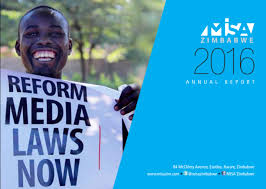By Byron Mutingwende
The Media Institute of Southern Africa (MISA) Zimbabwe has urged the government to ensure that the proposed cyber crime laws do not erode constitutional rights to free expression online and offline.
MISA Chairperson, Kumbirai Mafunda revealed that on the occasion of the commemoration of World Press Freedom Day held under the theme “In Defence of Digital Rights” at the Holiday Inn Hotel in Harare on 2 May 2017.
Mafunda said that some of the Bills, among them, the Data Protection Bill and Electronic Commerce Bill, if not amended, would infringe on fundamental rights to free expression and access to information.
“While it is the government’s mandate to protect the country from crimes generated through the Internet, the proposed laws should be fair, reasonable and justifiable in a democratic society,” Mafunda said.
MISA said that the proposed cybercrime law focuses more on criminalising offences against computers and network crimes while scantly focusing on protection of individual liberties or accountability in the process of dealing with the envisaged crimes. It called for clarification of the envisaged offences, in particular pertaining to what constitutes a computer system and pornography, especially given the severity of some of the punishments of up to 20 years imprisonment without a fine.
“The Bill also gives the police a wide discretionary search and seizure powers to gain data not provided for in terms of the warrant issued by a magistrate…For indeed citizens’ freedoms are critical in spurring peace and socio-economic prosperity that Zimbabwe is yearning for. This is critical when viewed against the universal 2017 World Press Freedom Day theme: Critical minds for critical times: Media’s role in advancing peaceful, just and inclusive societies.”
Win Mlambo, the Deputy Minister of Information Communication Technologies and Courier Service s said there was a need for the speedy implementation of legislative reforms ahead of the 2018 elections, which should be held in an open and free environment. His counterpart, William Dhewa, the Chairperson of the Media Committee of Parliament revealed that the new envisaged related Bills include the Information Act, the Broadcasting Act and the Films Commission Act.
“Cyber laws should speak to each other. The computer crime aspect of the Bill aims to protect the privacy of citizens and ensure the upholding of media ethics, which has become a cause of concern. It is unfortunate however that the alignment of the Zimbabwean laws has not progressed in line with developments in technology while the right of access to information should be strengthened,” Dhewa said.
Fortune Chasi, the Chairperson of the Parliamentary Legal Committee said that constitutional alignment in relation to advances in technology was not unique to Zimbabwe. He said that governments usually respond to technological changes with some measure of trepidation.
“Governments fear that the Internet and social media (Twitter, Facebook, Instagram) may be abused by people who may use foul language to attack others. In the same vein, Photoshop may be used to circulate images that misrepresent and inform the public. So such freedom can’t be tolerated and offenders should be prosecuted and punished. Moreover, journalists should be allowed to work freely but without infringing on the rights of certain individuals,” Chasi said.
Nelson Chamisa, the Parliamentary Portfolio Committee Chairperson of ICTs said it was folly to discuss digital rights without ensuring access since there are certain rural areas that are not covered by broadcasting, mobile and Internet networks.
“This is a national pride deficiency. You can’t discuss about digital rights when there is no access. Our government is lazy to deliver on digital access. The Cyber Bill reveals government’s fear about technological advancement as shown by its tendency to react instead of responding to technological issues. Unfortunately, the Bill doesn’t speak to issues of consumer protection,” Chamisa said.
Chamisa bemoaned the absence of convergence of operations as government owned companies like Powertel, NetOne, Telecel and the Postal and Telecommunications Regulatory Authority (POTRAZ) are often competing among themselves to the detriment of consumers. He called for the setting up of Internet exchange points as well as infrastructure sharing among mobile network operators.
“A National ICT Bill should lead to a national ICT Act which will ensure a converged licensing framework which will put Transmedia, the Broadcasting Authority of Zimbabwe (BAZ) and POTRAZ under one roof for policy coherence,” Chamisa said.
The legislator added that the envisaged Bill should protect the right to human dignity, personal security and privacy. He also urged the government to deal with the unprecedented level of piracy that was killing art, media and music industries.






